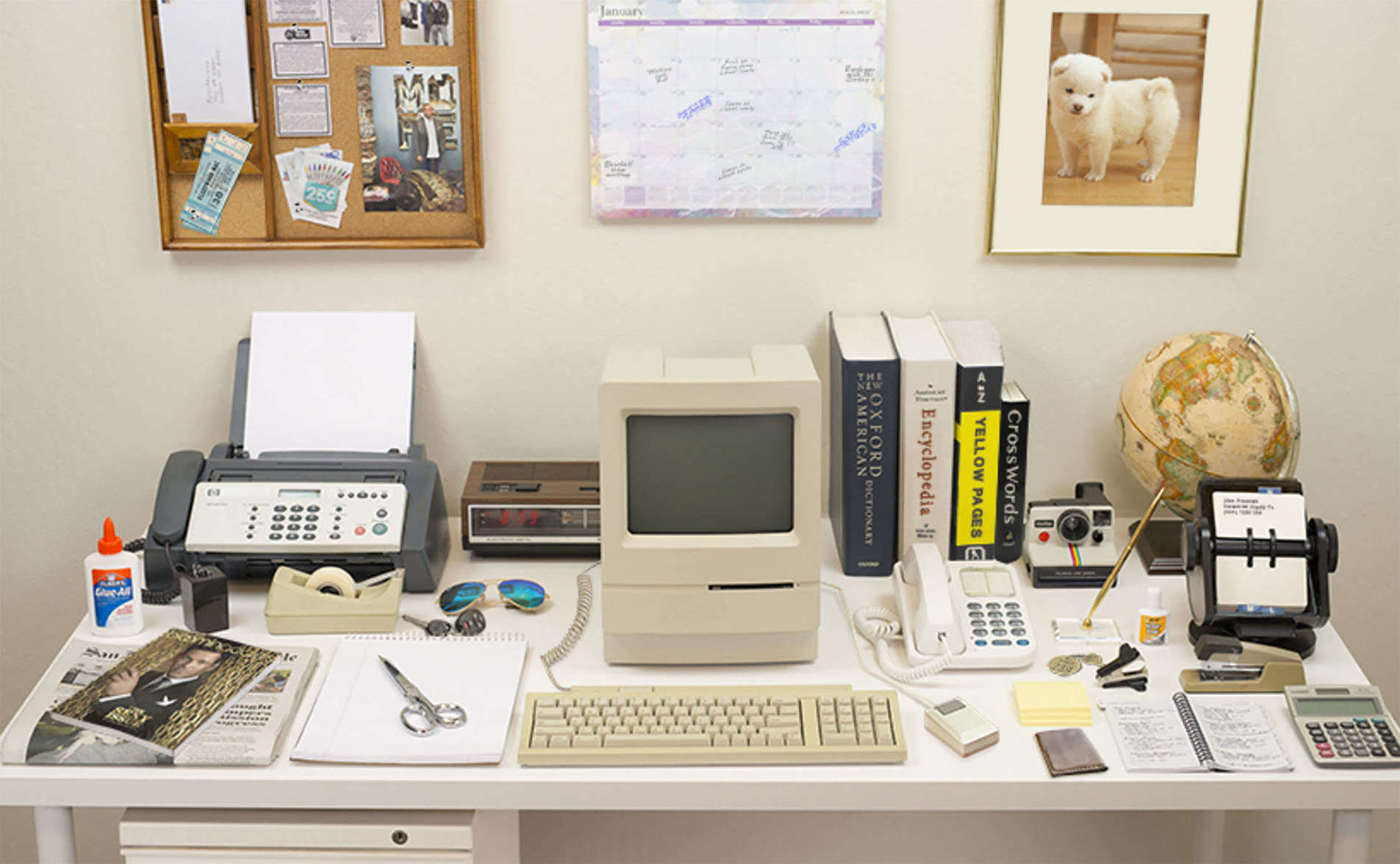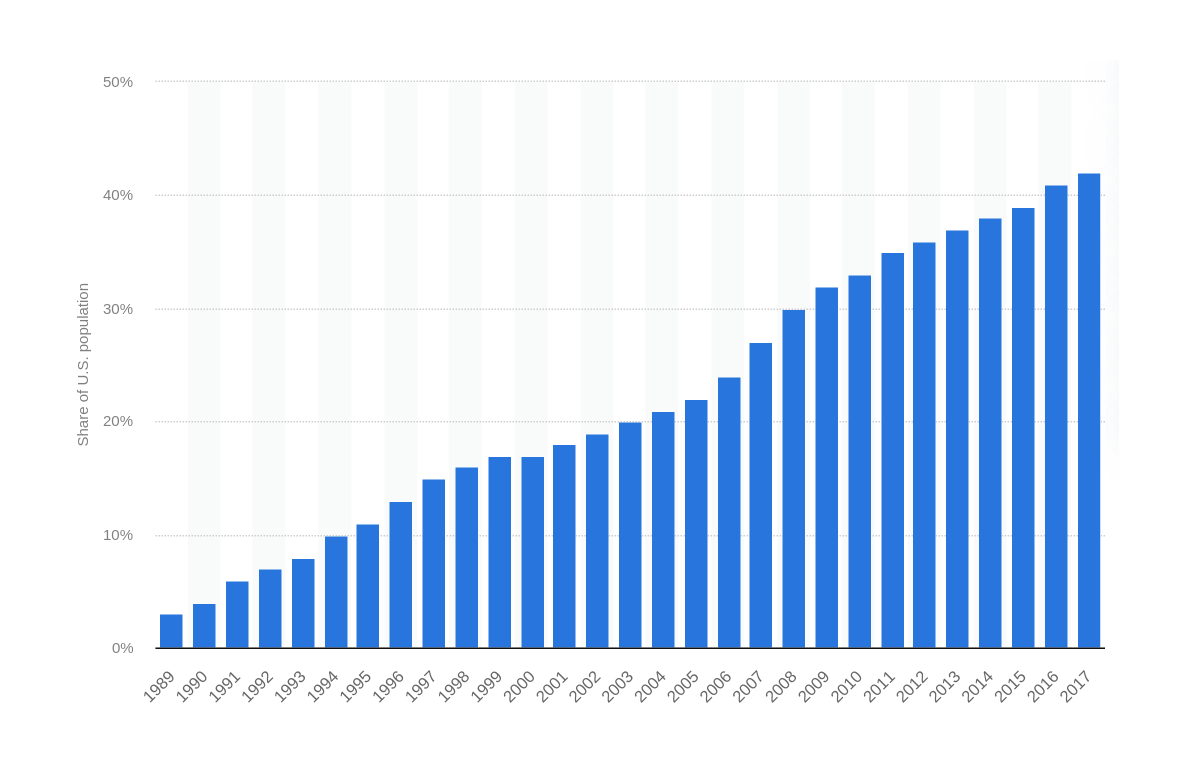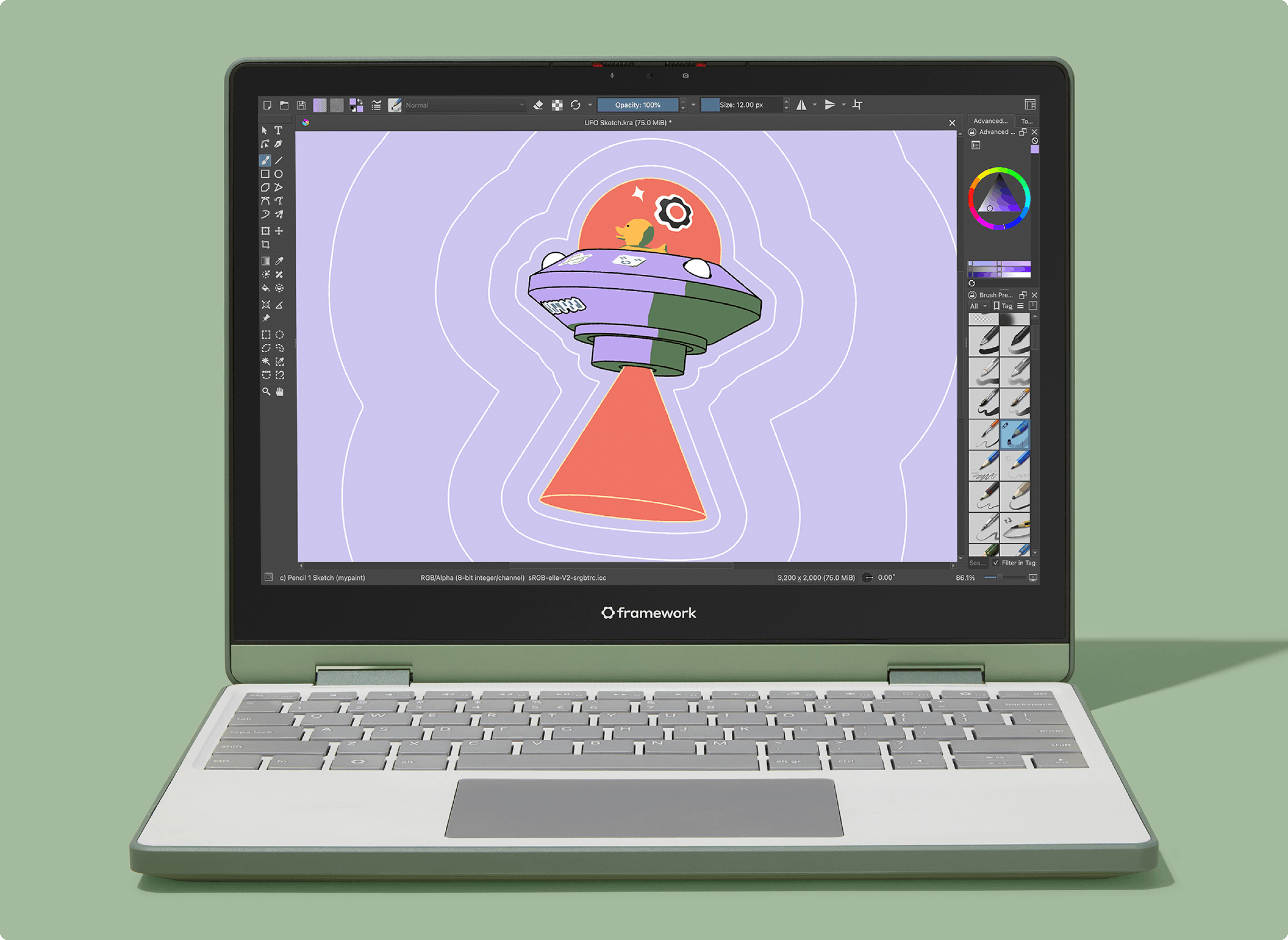A list of unheralded improvements to ordinary quality-of-life since the 1990s going beyond computers.
It can be hard to see the gradual improvement of most goods over time, but I think one way to get a handle on them is to look at their downstream effects: all the small ordinary everyday things which nevertheless depend on obscure innovations and improving cost-performance ratios and gradually dropping costs and new material and… etc. All of these gradually drop the cost, drop the price, improve the quality at the same price, remove irritations or limits not explicitly noticed, or so on.
It all adds up.
So here is a personal list of small ways in which my ordinary everyday daily life has been getting better since the late 1980s/early 1990s (as far back as I can clearly remember these things—I am sure the list of someone growing up in the 1940s would include many hassles I’ve never known at all).
Small stuff matters too. Progress is usually debated in terms of the big things like lifting the Third World out of poverty, eliminating child mortality1, or science & tech: discovering gravitational waves, creating world champion AIs, turning AIDS into a treatable rather than terminal disease, conquering hepatitis C, or curing deadly cancers with genetically-engineered T-cells. But as cool as those big things are, and matters of life-and-death for many, such achievements tend to be remote from ordinary people, and not your everyday sort of thing (or so one hopes). What about the little things in an ordinary life?

The 1980s Desktop2
The seen and the unseen. When I think back, so many hassles have simply disappeared from my life, and nice new things appeared. I remember my desk used to be crowded with things like dictionaries and pencil sharpeners, but between smartphones & computers, most of my desk space is now dedicated to cats. Ordinary life had a lot of hassles too, I remembered once I started thinking about it. (“The past is a third world country”, but America in the 1990s could also have used some improvement.)
These things rarely come up because so many of them are about removing irritations or creating new possibilities—dogs that do not bark, and ‘the seen and the unseen’—and how quickly we forget that the status quo was not always so. The hardest thing to see can be that which you no longer see. Who asks why lines got painted on roads, when “911” became a number you could call, or when ambulances became more than just repurposed hearses for people to die quietly in? I thought it would be interesting to try to remember the forgotten. Limiting myself to my earliest relatively clear memories of everyday life in the mid-1990s, I still wound up making a decent-sized list of improvements to my ordinary life.3
Roughly divided by topic:
Computers
With computers, it’s hardly worth trying to enumerate the improvements on every dimension, and it might be easier to list the exceptions instead—if I made a list of a hundred things, someone would chime in with another one I’d forgotten, like easy rental rooms through Airbnb or food delivery apps. But nevertheless, here’s a few:
-
Cheap: electronics prices keep falling.
These days, people whine endlessly online if a RAM or semiconductor shortage (something that happens every decade or so, as the industry has notorious boom-and-bust dynamics) means that they have to pay as much as they did a few years ago for something, but the long-term trends are dramatic.

My reaction to computing these days: “Ehhh‽”
You can buy things like top-end VR headsets or smartphone, which will cost less in real terms than a Nintendo NES/Famicom did on its 1983 Japanese release ($567.79$15019834, or the USA “Action” release my family had, $450.47$149.991988) or a Sony Walkman cassette player in 197946ya ($596.6$1501979). Kids in 2020 can’t even imagine having to pay $140.05$501990 for a new copy of Super Mario Bros. 35, much less $132.45$34.991983 for Atari 2600 Centipede—a far cry from paying $6.36$52019 these days for a great PC game during a Steam sale, or nothing at all for many of the most popular games like Fortnite. (And of course, often you would need to buy additional parts or gadgets or software, quickly amounting to more than the original PC or console itself…)
-
the Internet/Human Genetics/AI/VR are now actually things
Imagine dealing with the 2019–42023 coronavirus pandemic in 198936ya instead.
-
VHS tapes:
-
Not Rewinding VHS tapes before returning to the library or Blockbuster
-
not worrying about Blockbuster or library late Fines
-
Not Watching crummy VHS tapes, period
-
-
not making a dozen phone calls playing Phone Tag, to set up something as simple as a play date
-
hotels and restaurants provide Public Internet Access by default, without nickel-and-diming customers or travelers; this access is usually via WiFi
-
Satellite Internet & TV are affordable & common for rural people
-
All-You-Can-Eat Broadband:
-
Faster
-
Indefinite: not worrying about running out of AOL hours, liberated from the tyranny of time metering and (mostly) bandwidth metering
-
All Day: because you won’t be yelled at for tying up the (only) phone line
-
-
Ethernet: not needing to know the difference between PLIP, SLIP, IRQ, TCP/IP, or PPP to get online
-
20xx is The Year Of the Linux Desktop: no, but seriously, Linux X, WiFi, & laptops now usually work
-
Hygienic Mice: no longer needing to clean computer mice weekly thanks to laser mice
-
Hearing Aids are a small fraction the size, available over-the-counter, have gone digital with multiple directional microphones (higher-quality, customizable, noise-reduction)6, halved or more in price, become water-resistant, and even do tricks like Bluetooth
-
Noise-cancelling headphones: while noise-canceling tech in some form has existed for a long time in prototypes and specialized systems of various sorts, it would take until 198936ya for Bose’s first bulky noise-canceling headphone aimed at pilots for the low low price of $2,867.86$9951989, and then consumers a decade later. On a long flight, they’re as big an upgrade as first class (particularly if you can get a good movie going).
-
GPS: not getting lost while frantically driving down a freeway7; or anywhere else, for that matter
-
Universal Cables: USB cables mean that for connecting or recharging, we now only need to figure out ~10 different plugs instead of 1,000+ (one for every pairwise device combo)
-
Universal Fulltext: most books and scientific papers can be (perhaps with a little work) downloaded free—the ‘universal library’ came to pass, despite many peoples’ best efforts
-
Universal Search: search engines typically turn up the desired result in the first page, even if it’s a book or scientific paper; one doesn’t need to resort to ‘meta-search engines’ to cover a dozen search engines which each index a different tiny fraction of the Internet, or gradually building up enormous 20-clause Boolean queries to filter out noise
-
Universal Storage: we no longer need to strategize which emails or photos or documents to delete to save space
-
RAM: programmers able to assume users have 4GB RAM rather than 4MB RAM
-
Microsoft Windows Hacking: consumer computers in the ’90s were a pain because they all ran Windows and if you ever connected them to the Internet, there were so many ways to get hacked or systems degraded. This is far less of an issue now.
If you managed to never install a bad IE toolbar (or get hacked by one of the countless IE vulnerabilities) and managed to track down the safe version of every application you installed (there being no kind of package manager-based app store as popularized in the ’90s by Linux distros), you would still get hacked remotely by a worm (this was the golden age of Internet viruses/worms like ILOVEYOU/Code Red/Nimda/SQL Slammer). At MS’s nadir, people were estimating that botnets were so active in portscanning the Internet for vulnerable Windows systems that a new Windows installation would be hacked before it finished downloading security patches!
In January 2002 Bill Gates issued a memo and MS had its come-to-Jesus moment, making security a priority: switching to Windows NT as a foundation (benefiting from VMS designs), rewriting old code in memory-safe programming languages (especially .NET), investing heavily in static program analysis tools (some developed by MSR), adding free antivirus/firewall programs to Windows, increasing bug bounties, monitoring hacking more actively, releasing more free updates & moving to SaaS models (enabling continuous updates), adding telemetry to phone home about crashes (resented for “privacy” reasons despite being necessary to create actually-private software) and in general investing far more money into security.
-
Smartphones: far too much to list… (eg. GPS, and careless smartphone photographs are higher-quality than most film cameras from a few decades ago, particularly in niches like dark scenes where smartphone night modes can achieve things few or no non-digital film cameras were capable of)
-
Universal Audio & Video Calls: being ‘out of range’ scarcely exists anymore for urban & suburban dwellers; even rural areas have shockingly good coverage—one relative lives in a place so rural that he remembers when it didn’t even have street addresses (you simply mailed the person + town and the post office knew where to take it), but gets a perfect 3G signal.
-
-
Spaced Repetition has escaped the cognitive psychology labs, and has been a great blessing to foreign-language learners, medical students, and many others
-
nuisance Software Patents have been expiring (eg. GIF, arithmetic coding, MP3)
-
Universal Media Availability:
-
Back Catalogue Access: catching the tail end of a cartoon or movie on TV and being able to look it up instead of wondering for the rest of one’s life what it was about. (I’ve looked up some series I watched as a kid, and I had some strange misconceptions about them due to my fragmented watching…)
-
having Fansubs available for all anime (no longer do anime clubs watch raw anime and have to debate afterwards what the plot was! Yes, that’s actually how they’d watch anime back in the 1970s–1990s when fansubs were often unavailable)
-
everything is available Subtitled8, not just TV (accelerated by legislation making subtitle decoder chips mandatory in TVs ~1991)
-
most programs have a usable FLOSS equivalent and in some areas FLOSS is taken so for granted that new programmers are unaware they used to have to pay for even text editors/compilers or that Linux is Communism
-
Technology
-
HVAC: houses which are well-insulated & uniformly comfortably warm, and centrally-cooled, rather than leaky and using heaters or wall units9 running constantly creating drafts and hot/cold spots
-
Solar Panels & Battery Storage: enable local power which is more resilient than any grid could be
-
Showers: hot water heaters increasingly heat water on demand, and do not run out (while sometimes shocking the bather)
-
Low-Flow Toilets: in 199233ya, Congress & President George H. W. Bush outlawed toilets that worked, imposing an artificially low, arbitrarily defined limit that no working toilet could satisfy.
Thus I enjoyed a common 1990s experience: everywhere I went in new buildings, I would suffer the minor humiliation & disgust of having to use a low-flush toilet—if I didn’t walk into a dirty stall, then I might have to reflush, or just look at brown streaks in the bowl. Low-flow toilets continued to suck for a long time afterwards.
However, you may have noticed in new buildings or toilets, that the low-flush toilets are… working? Apparently, what happened was that in 2002, engineers Bill Gauley & John Koeller organized the “MaP” toilet-testing consortium to create a rigorous toilet test (the existing one being bogus) and test enough toilets to name-and-shame s—y designs, and after 2 decades of R&D, low-flush toilets now work.
-
Stoves which are increasingly safe and clean, because induction-based (rather than the perpetually dirty fire hazards of electric burners/gas stoves10)
-
Riding Lawn Mowers are affordable & common for rural people11
-
Power Tools (such as drills, leaf blowers, or lawn mowers) are increasingly rechargeable-battery-powered, making them more reliable & quieter & less air-polluting
-
speaking of Batteries: batteries last long enough that they are increasingly built-in—remember how advertisements always had to say “batteries not included”?—so no more mad scrambles at Christmas for AA or AAA batteries12 to power all the presents (which could easily add $14.01$51990–$28.01$101990 to the immediate total cost, and would have to be replaced in a year).
Given the exponential progress in battery costs & density, and wireless recharging becoming a consumer reality, it would not surprise me if within decades, small replaceable batteries become relegated to niches like extremely cheap disposable goods or specialty uses (eg. dollar-store toys, smoke alarms, flashlights), and young people start being confused what the difference between AA/AAA is or why one battery is rechargeable but another isn’t in much the same way that young people no longer know how to write a check. (In 2019, a bursar, whose college doesn’t take credit cards, showed me the giant sweepstakes-style novelty check she had to use as a prop to teach freshmen how a check is supposed to be filled out; it took coronavirus to force them to accept alternatives.)
-
-
Cars:
-
Reliable & Efficient: cars last longer and get better mileage13
-
all cars have electrified Power Windows; I don’t remember the last time I had to physically crank down a car window.14
-
Electric Cars are feasible rather than follies, and will be ordinary things in 5–10 years
-
Self-Driving Cars not long after that
-
-
Air Travel Democratized: airplane flights no longer cost an appreciable fraction of your annual income15, and people can afford multiple trips a year.
-
A less appreciated consequence is the general democratization of travel: travel ‘overseas’ (not to Canada via visiting Niagara Falls) used to be far more exotic than most people realize now.

For example, in the beloved 199035ya classic Home Alone, the protagonist Macaulay Culkin (who 4 years later played Richie Rich, amusingly) must fight burglars targeting the most expensive house in the neighborhood when his entire wealthy family leaves for a flight to Paris—because you would have to be the richest family in a rich neighborhood to jet everyone off like that.
-
-
Laser Pointers are no longer exotic executive toys or for planetariums, they’re things you buy off eBay for $1 for your cat. (Go crazy and buy three, to get colors beyond red; I suggest blue or purple.)
-
LED lights are more energy-efficient, cooler & safer, smaller, turn on faster, last longer, and are brighter than incandescents or fluorescents
-
a particular boon for Flashlights (which have, oddly, become their own online subculture, perhaps similar to mechanical keyboard enthusiasts: smartphones replaced many minor flashlight uses, leaving just high-margin collectors competing with each other)
-
-
Movie Theater Seats have become far more comfortable as movie theaters upgraded, now that they are forced to compete with DVDs/home-theaters (and then the Internet & video games):
In particular, they upgraded their uncomfortable school-style stadium seats to real seats; and concession prices seem like they’ve increased less than inflation, making them less of a total ripoff; going is more convenient, as I remember having to call the movie theater for times or check the newspaper to see which of several theaters might have a screening at the right time (crazy, I know); nor am I particularly nostalgic for film rather than digital projection, where damage to the film might be noticeable, and one had to wait on the projectionist (and is that where dirty film booth windows kept coming from…?).
-
EU: the European Union & single Euro currency make the EU easier to understand & travel in it much less tricky and expensive
-
Car Security:
-
Car Theft is rarer (because much harder), and in particular, we no longer have to worry about our car windows being smashed to steal our car radios17, or our GPSes
-
car Security Alarms no longer go off endlessly in parking lots. (It wouldn’t’ve been a normal day in the suburbs in the 1990s without hearing at least one. I don’t know if the car manufacturers fixed car alarms, or if everyone mutually agreed that this was not working out & stopped buying them. It seems to be a mixture of activism, consumer backlash, & improved physical security/reduced theft leading to alarm sensitivity being pared way back.)
-
-
Radios have minimal static
-
TVs no longer have rabbit ears that require regular adjustment
-
LASIK surgery has gone from an expensive questionable novelty to a cheap, routine, safe cosmetic surgery
-
Plushies: teddy bears & other toys are much more cuddly and silky
-
Clothing has become almost “too cheap to meter”, as the Industrial Revolution in textiles never stopped; employment in the US textile industry has cratered while garment per man-hour & per capita GDP in new textile-heavy economies like Bangladesh soars as textile automation continues.
In the USA, this delivered huge benefits as people are no longer wasted on tasks machines can do better and reducing environmental pollution thanks to de-industrialization & eliminating things like dye contaminant waste (see the environmental Kuznets curve & general improvement in US environmental quality)—eg the idea of, say, darning socks is completely alien18, and clothing companies routinely discard millions of pounds of clothes because it’s cheaper than wasting scarce human labor reprocessing & selling them for a song, flooding Africa with discards.
-
materials science has produced constant visible-yet-invisible improvements in textiles yielding, among other things like plusher plushies, far better insulated (and cheaper) winter coats: instead of choosing between winter coats which make you look like the Stay Puft Marshmallow Man or freezing (and if you get wet, freezing anyway) or exotic ultra-expensive garments aimed at mountain climbers, you can now buy ordinary (and much cheaper) winter coats which are amazingly thin and work even better to keep you warm—so much so that you have to be careful to not buy too well-insulated a coat, lest you swelter at the slightest exertion and be placed between the Scylla of overheating & the Charybdis of opening your coat to the freezing air to cool.
-
-
Wheeled Luggage no longer expensive or rare, but cheap & ubiquitous
-
Roach control: this is one I don’t remember, but apparently ~1990, roach complaints in America fell drastically due to a new method of roach poisoning, provoking much public comment at the time but quickly becoming taken for granted
-
Learning to Bike: starting ~1997, the traditional method for learning to bicycle, of spending weeks or months using training wheels which are gradually raised & removed (like I did), has been obsoleted by the “balance bike” method, which teaches children faster & safer.
Society
-
Lower Dysfunctionality: crime, violence, teen pregnancy, and abusive drug use in general kept falling, benefiting everyone (even those not prone to such things) through externalities
-
urban life: it is now reasonably safe and feasible to live in (most) big cities like NYC, Chicago, or DC—we’re a long way from Taxi Driver and annual summer urban riots (outside California). This is a large part of why urban living has become so much more desirable (with the unfortunate consequence of urban inelasticity driving up rents, as the increases in desirability outpace the non-increases in availability).
-
-
War on Drugs Lost: with the gradual admission that the War on Drugs was never a good idea, marijuana has been medicalized or legalized in many states, and psychedelics research is enjoying a renaissance; other drugs are increasingly treated in a more appropriate medical/rehabilitative framework
-
War On Smoking Won: somewhere in the late 1990s, the decline of smoking accelerated and it largely disappeared from public life—restaurants have gone from smoking, to smoking sections, to non-smoking entirely; and smoking in public outdoors has become rare. Aside from any health benefits, this makes everywhere smell and look nicer. (And to the extent smoking is stimulating and pleasant—see next point about nicotine!)
-
Nicotine gum & patches no longer require, absurdly, a doctor’s prescription to buy, benefiting quitters and stimulant users alike (although moral panics & deeply irresponsible reporting about adulterated black-market marijuana products have produced severe retrogression on vaping)
-
Environment: air quality in most places has continued to improve (and considering the growing evidence on the harms of air pollution, this may well be the single most important item on this whole page), forest area has increased, and more rivers are safe to fish in
-
Intellectual Property Maximalism rollback: copyright terms have not and probably will not be indefinitely extended again to eternity to protect properties like Mickey Mouse or Sherlock Holmes, and in 2019, for the first time since 199827ya, works entered the public domain; overreaching patents, both software and genetic, have been rolled back—Steamboat Willie is now public domain!
-
Board Games have been revolutionized by the influx of German/European-style games, liberating us from the monopoly of the Amerigame Monopoly
-
Logistics has become cheaper, faster, more reliable, and more convenient in every way:
-
Advances In Internet & Computers of course have superseded many logistical problems—the best-solved problem is the one you don’t have in the first place
-
USPS introduced self-adhesive stamps in the early 1990s, and by 201015ya, licking postage stamps was almost nonexistent (and not a moment too soon to guard against SF extortion plots!)
-
No More Coupon Scams: most people recognize rebates/coupons are scams, and the rise of discounters/warehouse stores/Internet shopping has largely obviated them
-
No More Mattress Scams: you can avoid ripoff mattress stores (typically owned by an exploitative oligopoly of mattress companies with massive margins) by ordering online, thanks to compact vacuum-compressed foam mattresses which can be shipped easily
-
the Shipping Cost of goods has plummeted
-
the Shipping Speeds have dramatically improved, especially for low-cost tiers: consider Christmas shopping from a mail-order company or website in 199926ya vs 2019—you used to have to order in early December to hope to get something by Christmas (25 December) without spending $63.28$301999 extra on fast shipping, but now you can get free shipping as late as 19 December! (“‘Same-day delivery’—what the hell is that?”)
-
the shipped Packages are also nicer: initiatives like Amazon’s “Frustration-Free Packages” have led to a trend of fewer clamshell plastic packages which can’t be opened without cutting your hand
-
-
Finance: change comes slowly to consumer finance indeed compared to Wall Street, but we can note since the ’90s the (half-assed) shift to chip cards and faster payments, cheaper remittances & free checking.
Food
The quality of the average person’s diet historically appears to be greatly overrated by nostalgia and ignorance19, and, for all the moral panics, we have things pretty good now. There are not many things in food that have gotten worse20, and most have gotten better—a lot better. Bright spots include:
-
Beverages, particularly Tea/Alcohol/Coffee:
-
high-quality loose-leaf tea widely available & popularized by chains like Teavana
-
microbrews/craft beers have revolutionized beer varieties & availability (similar things could be said of wine, cider, and mead)
-
safe McDonald’s coffee which doesn’t explode in one’s lap while trapped in a car & causing disfiguring third-degree burns requiring skin grafts
-
mass market coffee in general (McDonald’s & Dunkin Donuts coffee in particular) no longer taste like ‘instant char-fee’ (similar to Starbucks popularizing relatively high quality coffee)
-
Keurig & other Single-Serve coffee machines which heat the water separately from the coffee-making are increasingly common, especially in hotels; this means that tea drinkers (like myself) can make tea which doesn’t taste hopelessly like coffee due to ineradicable coffee contamination
-
-
Fast Food in general has gotten much better: much tastier (compare McDonald’s post-2003 chicken sandwiches with before), and safer, as we no longer worry about getting salmonella or E. coli from our burgers21
-
even Mass-Market Grocery Stores like Walmart increasingly routinely stock an enormous variety of foods, from sushi to goat cheese to kefir; and if you don’t like those, you can probably find a more upscale one like Whole Foods, which behind the egregious (like shelves of homeopathy) host the exotic
-
‘meat’ is a fad diet—since most nutrition research is BS and most fad diets don’t work either, it’s good to have one which is at least delicious
-
Sous-Vide cookers have gone from devices bought only by professional European chefs for thousands of dollars to a popular $91.65$702018 kitchen gadget
-
Fresh Guacamole can be easily bought due to pressure pasteurization (“Pascalization”), avoiding the inexorable spoilage of regular guacamole (and buying fresh avocados from the supermarket only to forget about it for a day and discovering it’s ruined)
-
Resealable Packaging on many foodstuffs reduces spoilage waste while also increasing convenience
-
Better Apples (not the computer kind): the tasteless mealy bitter-skinned so-called “Red Delicious” apples are still dismayingly common, but now one can buy (in most supermarkets) far superior varieties of apples, such as Honeycrisp apples (>199134ya) or SweeTango apples (>200916ya), with fascinating new varieties like Cosmic Crisp (ultra-long shelf life) or Autumn Glory (caramel/cinnamon flavor) coming out every year22 (thanks both to improvements in breeding technology and innovations in the “club” business model eliminating free-riding & the Red Delicious’s fatal race-to-the-bottom)
-
Seedless Fruit: Russ Roberts suggests 2 fruit examples: seedless grapes & watermelons.
I am not entirely sure about this one’s timing or quality: seedless grapes apparently go back centuries in Turkey and elsewhere, and were sold commercially in the USA well before the 1990s, with red/black grapes in the 1950s, and taste less strong than seeded grapes. And seedless (or triploid hybrids) watermelon go back to 193986ya in Japan (according to Andrus1971, citing Kihara & Nishiyama1947/Kihara1951, which are inaccessible), but commercialized perhaps around the 1970s–1980s in the USA.
-
-
Better Fresh Pineapples: apparently, only starting 199629ya could you reliably buy a whole fresh pineapple at the grocery store which would taste good (itself only the latest in a long history of pineapple progress)
-
Better Brussels Sprouts: Brussels sprouts no longer taste quite so bad due to artificial selection against the glucosinolates
-
Better Sausages: you no longer need to cook sausages to death, because trichinosis is now rare.
-
Discussion: Reddit: 1, 2; HN: 1/2/3, Lobste.rs, The Totebag, Twitter
-
“Fifty Years Of Growth In American Consumption, Income, And Wages”, Sacerdote2017
-
“What is economic growth? And why is it so important?”, Max Roser
-
“Ideas of India: The History of Textiles: Shruti Rajagopalan and Virginia Postrel discuss the development of textiles and their economic relevance in India and throughout the world”; “How Much Did a Shirt Really Cost in the Middle Ages?”
-
More Work For Mother: The Ironies Of Household Technology From The Open Hearth To The Microwave, Cowan1984
-
“The Wonders Of Economic Growth”/“A Visit from the Past: A reflection on progress looks at what might have been, and what is” David R. Henderson
-
“The PC & Internet Revolution in Rural America”, John Goerzen
-
“The Prosperity Pool”, Donald J. Boudreaux
-
“Young People Have No Idea What We Used to Do After Work. Let Me Regale You.”
-
“The value of technological progress: Evidence from the life of Matt Clancy”, Matt Clancy









 English (US) ·
English (US) ·